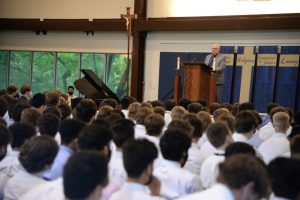During an October prayer service, our school president, Mr. Earsing, reflected on how the Profile of the Graduate of Intellectually Competent helps students grow in their faith journey throughout their lives. To be intellectually competent can be perceived in many different ways and how it will affect your understanding of many different things in life. Recently, I spoke with Mr. Earsing and learn more about why intellectually competent is important for everyone in the Jesuit community.
Interview
How did you choose the theme intellectually competent for this school year?
So, things that I look at are competing forces for good. We have universal Apostolic preferences from the general Society of Jesus. From this point, we talk about our care for the planet, the youth, the marginalized. Then, we have the profiles of the graduate at graduation. These profiles are open to growth, religious, committed to working for justice, intellectually competent, physically fit. So, these profiles or forces are good things and can be directly related to the Catholic Social Teaching (CST).
So, these competing forces overlap each other. For instance, when a student is a man for others, he should also be open to growth and loving you should be doing those kinds of things. Typically, I reflect on these ideas and then meet with Mr. Garrison to discuss. It’s what are the things we want to do well, and what we want to make sure that you know. Also, what are good things the students can do to represent intellectual competence in all the different facets. It’s important for us to do, with everyone and with COVID; it’s like something we probably should be highlighting. So how can we highlight it better? So, that is our focus for this year.

I’m a real big believer in what I talk about this in my social justice class that I teach. In Maslow’s Hierarchy of Needs, physiological needs come first (e.g. water, shelter). For example, basic needs are essential because if you’re worried about getting eaten by a bear and you’re worried about not having enough to eat and you’re cold and shivering in the ditch with your kids, then you probably can’t be thinking about being a man for others. So, the idea is to be able to get those basic needs met. After meeting basic needs, then you could be in a position to do a great job of how can I make the world better and how can I raise everybody to be intellectually competent.
It is really in some ways, for students, the key to what you’re going to end up doing with your life. So, you know it seems we have numerous doctors in Dallas who graduated from Jesuit Dallas. For instance, Dr. Handler, head of safety and security at Parkland hospital, has done great things for the hospital and has recently retired. Dr. Handler gives lectures on infectious diseases, and he was instrumental working on community service initiatives.
In addition, there are other doctors who are just as excellent as Dr. Handler. Dr. Michael Toll is an infectious diseases internist here in town. A graduate, Dr. Chris Mann is the head of the neuroscience department at UT Southwestern Medical School. Dr. Rick Snyder is a cardiologist. I’m just telling you guys that I have in my brain right now and there’s a bunch of different ones. Well, they’re out a lot of them are doing great things.
We have many guys that do that, so they do many good things through the medical field because they love medicine. What allows them to give back is intellectual competency giving them the medical degree and their heart of a servant that Jesuit gives them. So, I think that is what enables you to do a whole lot of things. Whether being a chiropractor or a surgeon, we have many great men who are doing great things in the community.
How did the passage about the talents- Matthew 25: 14-30 – relate to intellectually competence?
When I was in high school, I tended to read biblical passages only to understand the surfaces. However, I was not looking at the deeper meanings of the passages.
When I first read the Prodigal Son, I felt empathetic for the older brother who was not treated fairly by the father. When I first heard the parable of the talents, I thought how horrible it would have been to suffer from robberies. So, I thought it would make sense for the servant to hide his talents. But, the parable’s message is that the talents are God’s blessings, and you understand it that way and begin to truly understand the deeper meaning. Overall, the parable of the talents is talking about all the gifts we get from all over and how we apply them to our lives.

Can you tell me more about the different types of intellectual thinkers and how they work?
Rational, emotional, and symbolic are the three types of intelligence. I look at it as also that you have the intellectual capacity for top level [things] where you can go do stuff with it, but there’s also people that have a high emotional intelligence that are very empathetic. I think that’s also symbolic about what we look at and what is wonderful about having strengths. So much of what we learn and do there are connections to it.
At one point, I was talking with students of the AP Environmental Science and theology classes. I remembered asking the students what event led the United States to enter into World War Two. Most of the students said it was Germany’s invasion of Poland. However, I said that one could make an argument that World War One and the ensuing Treaty of Versailles that led to World War Two.
But I said how science gets involved in there. So, Woodrow Wilson was president of Yale University, and they called it the warrior and the scholar. Based on their history and service as presidents, Roosevelt was considered the warrior, while Wilson was the scholar. The reality is that Roosevelt was a scholar too, but Wilson had this plan. So, Roosevelt said he wasn’t going to run for president, but he ran again and lost. Wilson was a Democrat and he got elected because Roosevelt split the Republican Party.
So, Wilson was there, and Wilson gets into the war and there’s all different things that happened in World War One. Then, Germany surrenders, and they put such horrendous restrictions and reparations on Germany that they could never get out from. France, Belgium, and England and Wilson was supposed to organize that with the League of Nations and do some other things.
However, Winston suffered a stroke and his wife had to help run the country. What’s interesting from a medical point of view is that the Spanish Flu of 1918, which wasn’t from Spain. But, the reason why they called it the Spanish Flu was because Spain was neutral and the Germans were furious at Spain’s neutrality in WW1. The Spanish Flu really started in an army camp in Kansas, United States. It was a COVID-like virus and it caused inflammation of the blood vessels, occasionally, there was a lot of people died from that. Wilson had it and they think that’s what caused him to have the stroke. So, a COVID like Spanish flu was what caused what happened with Wilson.
Because Wilson wasn’t able to control the reparations, British and France severely punished Germany which would set up the stage for Hitler to seize power in Germany. So, you think about that, so it was really the science and the medical issue that caused Wilson to get sick that set the stage for the horrendous reparations for Germany, which put Hitler into power all because of a COVID-like flu. Everything is connected and no issue is isolated. In my opinion, it’s always interesting to make broader historical connections while being intellectually competent.
How has the theme of intellectually competent helped you in your life?
I’m a real big believer in the fact that we have to be lifelong learners. But, I think that the part I don’t reflect on a lot is that I ever would ever stop learning. The more you read and understand things, the more you realize that life isn’t very black and white. Life is usually gray and there’s multiple facets of everything that goes on most times. I think we can try to figure out what God’s will is in the path we should be taking. For example, I love Merton’s prayer where he says, “I don’t know if I’m doing what you want me to do God, but I think that me trying to do what you want me to do pleases you.” I try to model my life after Merton’s prayer. If I can figure out what God would like me to do, I believe that it works out very well.
I’m proud of the way you guys conduct yourselves and what you guys do. I have been at Jesuit a while and I’ve seen a lot of great guys graduate from here. I see all the wonderful things that they do whether not just the doctors, but the guys who are salesman, realtors, engineers, and military servicemen. In general, I believe that our alums do a wonderful job in being men for others and following all the things that we hope and pray that you guys follow. So, I’m really happy about that, and I know that being intellectually competent helps me to help students to be men for and with others.
Stay tuned to The Roundup for more prayer service news!






